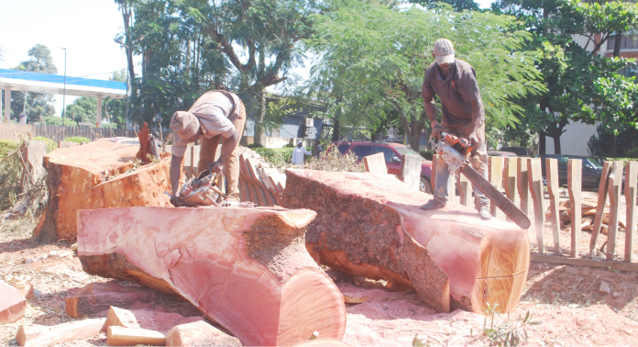W’African countries present scorecard on climate change
Climate change has adversely affected lives and economic activities in the West Africa region. The 2019 second ordinary session of the ECOWAS Parliament allowed lawmakers from the countries to present their scorecard on efforts in mitigating the global menace. According to the UNDP Climate Change Adaption, West Africa’s vulnerability to climate change stems from a […]

Lumber jacks at work along Muhammadu Buhari way as the Kaduna Urban Renewal Project commences
Climate change has adversely affected lives and economic activities in the West Africa region. The 2019 second ordinary session of the ECOWAS Parliament allowed lawmakers from the countries to present their scorecard on efforts in mitigating the global menace.
According to the UNDP Climate Change Adaption, West Africa’s vulnerability to climate change stems from a high regional reliance on climate-sensitive economic activities such as rain-fed agriculture, livestock rearing, fisheries and forestry, and the presence of large population clusters in coastal urban areas.
UNDP, in 2011,pointed at low capacity of regions social and ecological systems to cope with climatic extremes; and existing strains on ecosystem services due to processes such as loss of productivity and deforestation, adding that as such, climate change is broadly expected to adversely affect West Africa’s future development.
Few years after the report, climate change has led to unusual weather conditions with heavy rainfall, particularly in October and November 2019 in Ghana. No fewer than 85 people have died from floods in Ghana and Niger.
Cape Verde has faced three consecutive years of drought with very low rainfall, while degradation has affected 34 per cent of lands, representing more than nine million hectares of arable lands in Burkina Faso.
Ghanaian lawmakers said the weather conditions led to flooding in northern Ghana killing 28 persons.
Also in Niger, heavy rains recorded in August and September led to serious floods in several regions of the country. Lawmakers from Niger said 16,093 households and 132,528 persons were affected by the floods while 57 people died. A total of 12,241 houses collapsed and 851 animals were unaccounted for.
Lawmakers from Senegal reeled out the imminent dangers of climate change saying it has led to a decrease in rainfall of about 300mm in 30 years with heavier rain but of shorter durations. They said an increase in temperature of about 1.7oC in 30 years and other negative effects of climate change have led to encroachment of the sea, coastal erosion, desertification, reduction of mangroves, loss of arable land and pasture and reduction in the availability of water for irrigation, drinking and other productive activities.
Ghana is implementing a number of climate change programmes, including the promotion of renewable energy aimed at lowering deforestation and forest degradation and also pursuing low carbon electricity, building resilience and investing in adaptation projects such as sea defence projects.
The country has also launched a National Climate Change Adaptation Strategy (NCCAS). “The overall goal of the NCCAS is to enhance Ghana’s current and future development by strengthening its adaptive capacity and building resilience of the society and ecosystems to the impacts of climate change,” its lawmakers said.
The country has supplied more than one million improved cookstoves to households and invested 13.2 billion dollars in natural gas infrastructure. It has also engaged 20,000 youths to plant 10 million trees in order to increase the carbon sink.
Similarly, the Gambian government has introduced an environmental tax levied on all goods, imported (second-hand vehicles, clothes, batteries, etc) into the country with potential adverse effect on the environment.
The country also continues to observe the ban on the importation of plastic bags and other elated plastic materials.
While Cote d’Ivoire suffers from the negative effects of climate change, lawmakers from the country said the government was committed to reducing greenhouse gas emissions by 28 per cent by 2030. It would then increase the share of renewable energies in the energy mix with a target of 16 per cent by 2030.
Also in Cape Verde, integrated policies are being implemented aimed at ensuring greater environmental sustainability, competitiveness and territorial organisation. The country has faced three consecutive years of drought with very low rainfall.
“The country has continued to face serious problems with lack of grazing for animals. The government requires to implement emergency mitigation plans to address years of drought.
“The potential effects of climate change in the country require the issue to be at the centre of the authorities’ concerns, supported by an appropriate scientific approach involving national knowledge centres,” the lawmakers led by Orlando Dias said.
In Burkina Faso, climate change is adversely affecting rural development, owing to the constant decline in rainfall in terms of volume and quality of precipitations as well as high temperatures, upsurge in the number and intensity of floods, droughts and wind storms.
“These extreme weather conditions hamper the performance of agricultural, livestock and animal production systems and lead to increased population movement as well as serious humanitarian problems and economic losses.
Degradation has affected 34 per cent of lands in the country, representing more than nine million hectares of arable lands,” the lawmakers said.
They said to improve the living conditions as well as the production and consumption patterns of the people and prevent environmental degradation and the degradation of the living environment, the government had fast-tracked the implementation of specific actions and measures defined in the Second National Rural Sector Programme (PNSRII) to ensure the sustainability of agricultural production in the country.
